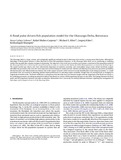A flood pulse driven fish population model for the Okavango Delta, Botswana

View/
Date
2012-03-10Author
Linhoss, Anna Cathey
Munoz-Carpena, Rafael
Allen, Micheal S.
Kiker, Gregory
Mosepele, Ketlhatlogile
Publisher
Elservier, www.elsevier.com/Rights holder
ElservierType
Published ArticleMetadata
Show full item recordAbstract
The Okavango Delta is a large, remote, and ecologically significant wetland located in Botswana that receives a strong annual flood pulse. Although the hydrology in flood pulsed systems is often theorized to drive fish population dynamics, in the Okavango Delta there are no monitoring or modeling studies that quantify this complex ecological relationship. The objective of this work was to produce and analyze a mechanistic fish population model of the Okavango Delta that is driven by the annual flood pulse in order to corroborate the theory that Delta fish populations are driven by the flood signal. The model tracked age cohorts over time with density dependant recruitment, mortality, and vulnerability components. Global sensitivity analysis identified the parameters that were the most important in determining the model outcome. Monte Carlo filtering truncated prior parameter probability density functions and refined model uncertainty. One of the unique outcomes of this research was the identification of polishing parameters, i.e. model parameters that are essential in obtaining optimal model performance by matching output variability, though they are not important in changing the magnitude of model results. The flood coefficient (a scaling factor that describes how recruitment changes with the magnitude of the flood) was shown to be a polishing parameter, providing quantitative evidence that floods are a driver of fish population dynamics in the Delta. This linkage between the flood pulse and fish population dynamics provides quantitative information that is necessary for making informed decisions regarding the management of hydrologic and ecological resources in the Okavango Delta.
Collections
- Research articles (ORI) [270]
